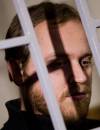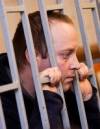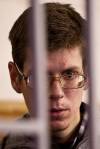• Topics / Against torture and ill-treatment
• Topics / The right to a fair trial
A Way out of Impasse over the Zaporizhya Church Bomb Case



Ukraine’s leaders have over the last 2 years shown both disturbing contempt for rule of law and astounding ability to shoot themselves in the foot. Nor are all the victims of crass interference in law enforcement and judicial proceedings politicians.
There are also three young men who have spent two years in custody after President Yanukovych took a bomb explosion in a Zaporizhya church “under his control”.
While it is for the court to determine guilt, there are very serious grounds for concern over this case. It seems therefore imperative - in the name of justice and the rule of law – for religious and human rights organizations to take the situation under their civic control and demand that the young men be released from custody.
Intervention is vital especially following publication of a damning assessment of the pre-trial investigation which in most democratic countries would have immediately prompted the judge to declare a mistrial. This has not happened, and in Ukraine’s present climate, it is unlikely that the prosecution and the courts will risk taking initiative without firm action from all those unwilling to leave three young men who have not been convicted of any crime languishing in prison.
The story began with a homemade bomb planted in the Svyato-Pokrovsk Church in Zaporizhya. The explosion on 28 July 2010 the day of a religious festival marking the Baptism of Kyivan Rus, injured 9 people, one of whom – an 80-year-old nun - died later in hospital.
On 29 July a meeting was televised between the President and the Interior Minister, the Head of the Security Service and Prosecutor General. President Yanukovych made stern demands for the crime to be solved immediately and received assurances that this would be done within a week.
Lo and behold, on 6 August Anatoly Mohylyov, then Interior Minister announced that the case had been solved and three people arrested.
There were questions over this case from the outset since the main “proof” is in confessions which the defendants have all retracted and said they made under duress. There is also the sheer improbability of the supposed conspiracy and motivation. While the investigators asserted that Anton Kharytonov had been dismissed from his post as sacristan at the Svyato-Pokrovsk Church over money issues, it would seem that he was suspended only for a month from serving at the altar. This in itself makes the revenge motive unconvincing while the roles supposedly played by his brother Serhiy Dyomin and another sacristan, Yevhen Fedorchenko also stretch credulity. Even should we assume criminal tendencies, and there are absolutely no grounds for doing so, the fact that Anton himself has learning difficulties would make playing major roles in helping him to carry out a grave crime and hoping not to be caught particularly reckless.
There is increasingly more detail of a much more convincing version, this involving a conflict linked with church land. The reluctance of the law enforcement bodies to consider compelling evidence could, if we were very kind, be attributed to some information they are not divulging. It is impossible to find a good explanation for their failure to give attention to alibis in all three cases which totally refute a serious part of the prosecution’s case.
Just as disturbing is the fact that the police are making no effort to track down the “unidentified individual” who is alleged to have sold Anton’s brother Serhiy the explosive device. Confirmation of the real worth of the “confession” which Serhiy asserts was beaten out of him can be seen in the existence of a different line taken by the investigators regarding the bomb. Serhiy was supposed to have put the bomb together himself and there is a recording of him trying - most unconvincingly and with prompts from the investigator – to describe actions which never took place..
All of the above has been written about many times yet the three young mEn have been held in custody since August 2010 with the latest application for a different restraint measure having been rejected a week ago. This came after a new development which on the eve of International Day in Support of Victims of Torture particularly warrants attention.
At the last court hearing in Zaporizhya on 13 June the court considered the results of an expert assessment by the Donetsk Forensic Investigation Institute which found that the three accused had all given testimony under intense psychological pressure. It is frustrating that such a devastating conclusion did not receive wider publicity. Perhaps the word “psychological” is to blame with people somehow thinking that “at least it wasn’t physical” or simply not aware what was meant at all.
The expert was asked to prepare an assessment on the basis of the video material available. He was not asked about beating and other forms of physical pressure which would certainly not be captured on the limited video footage. He analyzed the most important elements in the testimony and investigation and his results effectively undermine the entire investigation and charges.
We read in one place that “the majority of questions were of a closed or half-open nature with the accused himself when asked questions which demanded more specific information regarding a general answer directly or indirectly avoiding answering. This led to the interrogator who had the relevant procedural status to know the specific circumstances asking questions with a prompt communicating the information which S. Dyomin had not himself given during the interrogation”
Just one such lapse in the investigation would be enough to overturn the case in countries where rule of law is respected, and it is far from the only one.
What is more, this is not the only expert assessment. The court ordered the Donetsk Institute assessment after the defence in November 2011 applied to have the expert assessments from a Luhansk Institute added to the court material.
That earlier assessment is at least equally damning. It is worth noting, for example, the analysis of the first interrogation of Anton Kharytonov whose alleged grudge against the church management is deemed the motive in this case..
“There is no monologue in which A Kharytonov gives testimony relating to the event under investigation. His answers are in the main short, often containing the semantic unit from the interrogator’s question. There are also often expressions like “probably”. “seemingly”, “maybe”, “I think”, which the investigator on several occasions told him off for.
A. Kharytonov during the interrogations and reconstruction of the situation and circumstances of the event was being led [by the interrogator] which demonstrates a lack of independence when giving testimony”.
This, it should be remembered, is the young man who is supposed to have incited his elder brother and another church sacristan to carry out an extremely serious crime for the sake of revenge.
While the court ordered the expert assessment from the Donetsk Institute, it was in no hurry to review the results received back on 24 April 2012. They were examined on 13 June with the Prosecutor complaining that the psychologist had not been summoned for questioning and claiming that he had not answered all the questions. Senior Prosecutor Andriy Kmyet’s accusation is breathtaking enough to be quoted in full: “Certain improper statements were made, that is, answers were given to questions which had not been put by the court in appointing such an expert assessment. We can therefore in principle say that the expert slightly overstepped his authority”.
The records of the interrogations of all three young men can be found on the Internet, together with the expert assessments. It is easy to determine who exactly overstepped their authority when they “supplemented” the answers of three young men with details of a crime the defendants, it would seem, knew nothing about.
It is much harder to understand why the court heeded the Prosecutor’s demands and ordered a NEW (fourth) expert assessment, this time from a Kyiv institute. It is difficult to imagine how this could seriously differ from the others. If it did there would be good grounds for translating everything and asking international experts to give their assessment.
The new expert assessment, expected no earlier than September, still further drags out the trial of three young men when there are already ample grounds for speaking of a grave violation of their right to a fair trial. From that fatal moment when President Yanukovych demanded swift results which were duly provided it has been clear that all those involved with ensuring that the President’s wish was fulfilled would be frightened to admit a mistake.
Let them worry about how to extract themselves from this mess. For religious and human rights organizations the task must surely be to intercede on behalf of these three young men and demand their release from custody.





